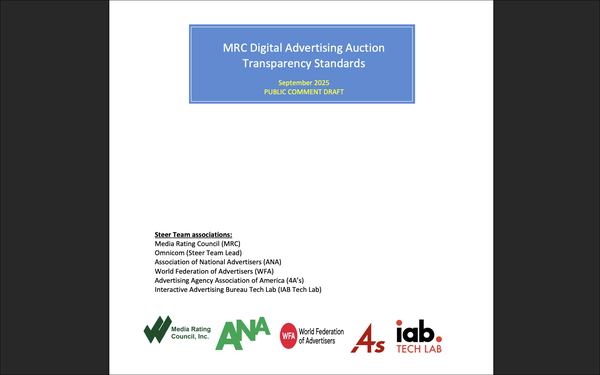
Nearly two years ago, executives at OMD
Worldwide, an Omnicom agency, approached the Media Rating Council (MRC) and then began developing standards to bring transparency to the ad industry. Now the agency wants companies across the ad
industry to adopt them.
The MRC Digital
Advertising Auction Transparency Standards is a project in an ongoing quest by the organization to set standards across advertising.
Working group members in the MRC group include Meta and
Amazon, reported The Wall Street Journal, citing people familiar with the matter, and Google -- the largest ad company -- declined to participate.
The proposal or document
provided by the MRC does not mention companies by name, but it comes as regulators have taken a heightened interest in digital ad auctions.
advertisement
advertisement
It was developed with a large group of media content
providers, advertising agencies, advertisers, vendors/consultants, ad auctioneers, measurement organizations and other organizations. Buyer-side trade organizations such as the 4As, the ANA and the
WFA also were involved.
The framework is intended to enable MRC auditing of operators of digital auction systems that voluntarily submit to the MRC process, for compliance assessment and
MRC member review.
Those that adopt the MRC standards would need to agree to disclose key information such
as the types of auctions they run, how they determine winners and what influences prices on their platforms, including any fees, discounts or bidding minimums.
They would also pledge to
disclose any significant changes.
Each platform has its own proprietary auction system, and users of these systems may have limited information with regard to how these auctions operate, but
the standards would change that for those companies wishing to participate.
A significant but smaller portion of ad auctions occur in programmatic, characterized by using the OpenRTB standard,
according to the standards.
Transparency, according to the standards, would close the door to manipulate the auctions and possibly drive up ad prices. When implemented in a fair and
transparent way, ad auctions have the ability for the advertisers to gain the most value.
MRC representatives said there is not a relationship between the proposed standards and
Google's remedies, but the industry seems to be pushing for the same things, inside and outside the courtroom.
Whether or not intended, many of the requirements stated in the report are
in sync with recent requests made by U.S. District Court Judge Amit P. Mehta during Google remedies monopoly trial.
The liability decision of Google's monopoly trial occurred
in August 2024 and a subsequent remedies decision was made in September 2025. The initial August 2024 ruling established Google's monopoly, while the September 2025 decision mandated
the transparency and data sharing requirements.
Mehta ruled that Google must provide greater transparency around its ad auctions process and share some of its search and
user-interaction data with “Qualified Competitors," among other things.